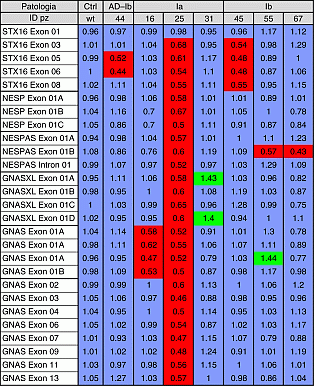ICEECE2012 Oral Communications Bone (6 abstracts)
The Young Investigator Winner
F. Elli 1 , L. de Santis 2 , M. Filopanti 1 , P. Beck-Peccoz 1 , A. Spada 1 & G. Mantovani 1
1Fondazione IRCCS Ca’ Granda Ospedale Maggiore Policlinico, University of Milan, Milan, Italy; 2Regina Margherita Children’s Hospital, Turin, Italy.
Pseudohypoparathyroidism (PHP) type I includes two major subtypes, Ia and Ib. About 70% of Ia patients, characterized by Albright hereditary osteodystrophy and multihormone resistance (PTH/TSH/GHRH/gonadotropins), carry point mutations in GNAS exons encoding Gsα. About 60% of Ib patients, with hormone resistance limited to PTH and TSH, have methylation defects within GNAS locus (sporadic or genetic-based). Recently, methylation defects were detected in pts with Ia phenotype, suggesting a molecular overlap between the two forms. Despite advances in the determination of molecular mechanisms underlying PHP, 30–40% of patients lack a molecular diagnosis. Moreover, it is unclear whether apparently sporadic imprinting defects are rather secondary to genetic defects. In order to simultaneously investigate for GNAS and STX16 deletions/duplications and for GNAS imprinting status (A/B-AS-NESP-XL DMRs), we performed methylation specific multiplex ligation-dependent probe amplification (MS-MLPA) in 96 patients (Ia=48/Ib=48), all negative for Gsα mutations. In 15 patients we detected rearrangements at GNAS and/or STX16 genes (known to be implicated in autosomal dominant Ib). In particular: i) of 8 PHP-Ia patients: two patients with apparent methylation defects carry a deletion of the entire GNAS locus, 1 had A/B loss of methylation (LoM) caused by STX16 deletions, five had deletions encompassing Gsα exon 1; ii) of 7 PHP-Ib patients: five had A/B LoM associated with STX16 deletions and two showed both extensive methylation defects and deletions within the AS region. In conclusion: a) MLPA proved to be a reliable method to detect genetic abnormalities associated with PHP-I, both known and novel to the literature; b) PHP-Ia and Ib may be caused by GNAS submicroscopic structural mutations; iii) All PHP-I patients negative for Gsα gene mutations should be considered for further molecular investigations to optimize genetic counselling. Ongoing studies are aimed to characterize the newly detected deletions and to investigate the function of the involved regions.

Declaration of interest: The authors declare that there is no conflict of interest that could be perceived as prejudicing the impartiality of the research project.
Funding: This work was supported, however funding details are unavailable.




